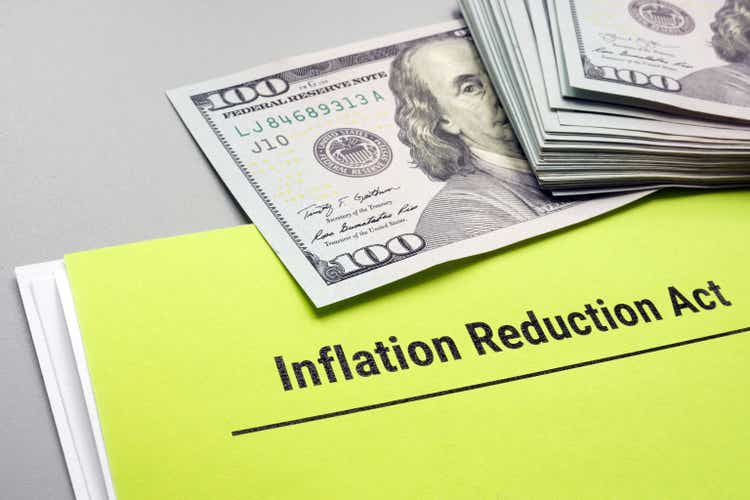
designer491/iStock via Getty Images A historic piece of legislation that is set to become low this week, empowering Medicare to negotiate prescription drug prices, among its other measures, is unlikely to cause a significant impact on the pharma industry, Bank of America and UBS argue. On Friday, the House of Representatives voted 220 to 207 along party lines to pass the Inflation Reduction Act, which had cleared the Senate days ago after a marathon 27-hour session. "Today, the American people won. Special interests lost," President Joe Biden said of the legislation, which also includes measures to fight climate change and cut domestic greenhouse gas emissions. As Biden expects to sign the legislation into law this week, Wall Street and industry experts offered mixed views on one of its key provisions, which will bring negotiating power to Medicare for the first time ever. The bill permits Health and Human Services Secretary to negotiate prices for Part B and Part D drugs covered under Medicare, the government insurance program for senior citizens and people with disabilities. While the bill addresses 64M Americans enrolled in the federal program, it excludes the private insurance market: More than 150M Americans and their families have commercial coverage through employers, and over 14.5M have Affordable Care Act policies. Under the legislation, the pricing negotiations will be implemented across four stages over several years. The first set of talks is expected to impact the prices of 10 Medicare Part D drugs in 2026. Potential targets for negotiations According to Andrew Mulcahy, an expert on prescription drug prices at the RAND Corporation, the bill permits HHS to negotiate prices for drugs that lead to the largest expenditure in Medicare Parts B and D and for those marketed for years without generic or other competitors. Based on Medicare spending in 2020, Bank of America highlighted a set of potential Medicare D drugs that could be subject to pricing negotiations. The list includes blood thinners Eliquis and Xarelto which added $6.5B and $2.4B in 2021 for manufacturers Bristol Myers (NYSE:BMY) and Johson & Johnson (JNJ) in the U.S. with ~18% YoY and ~4% YoY growth, respectively. According to BofA analysts, Merck's (MRK) anti-diabetic medication Januvia and AbbVie (ABBV) blood cancer therapy Imbruvica will also be subject to Medicare negotiations when the bill takes effect in four years. Under the Medicare Part B program, BofA projects Merck's (MRK) cancer medication Keytruda, Regeneron's (REGN) eye disease therapy Eylea, and Amgen's (AMGN) osteoporosis injection Prolia would also be candidates for pricing negotiations. Immune therapies Opdivo and Rituxan, marketed by Bristol Myers' (BMY) and Roche's (OTCQX:RHHBY) (OTCQX:RHHBF), respectively, are also included in the list. Impact on industry While it is hard to predict which drugs Medicare will target, BofA estimates that negotiations will lead to a 25% price reduction for the 25 drugs the program spends the most in 2026 and beyond. The firm does not expect the bill to cause a significant impact on industry growth. Meanwhile, noting the limited scope of the provisions, UBS argues that Medicare negotiations under the bill are unlikely to be the worst-case scenario for the industry. "We think the ultimate passage of the current drug pricing reforms represents a clarifying event in terms of future industry earnings, removing the risk of more onerous drug pricing that has weighed on biopharma valuations since the drug pricing issue first rose to political prominence in 2015," the analysts wrote in a research note this week. However, the industry lobby group PhRMA disagrees. Issuing a statement on Friday after the House passed the legislation, President and CEO of PhRMA Stephen Ubl remarked: "After many months of legislative wrangling, we are left with a partisan, government price setting bill that will lead to fewer cures and treatments and doesn't do nearly enough to make medicines more affordable for most Americans." Read: Seeking Alpha contributor High Yield Investor discusses the essential elements of the 'Inflation Reduction Act that investors should know.












Comments
0 comment